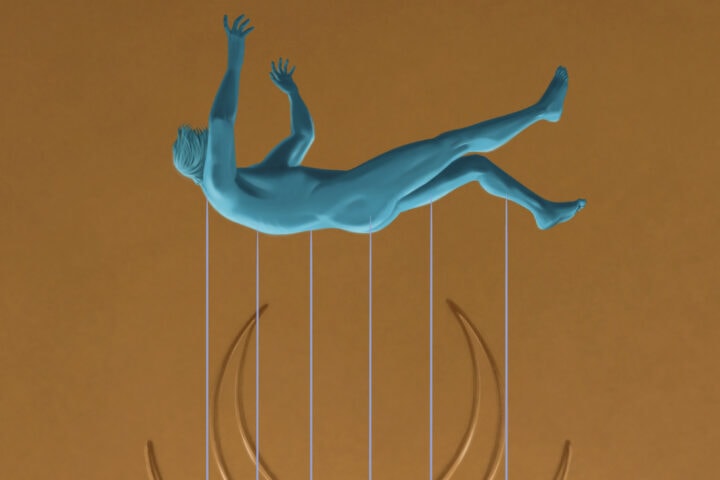For a musical so dedicated to celebrating and critiquing the transformative potential of cinematic fantasy, Bill Condon’s Kiss of the Spider Woman brings relatively little of the kind of overwhelming star power that can truly transport audiences. This isn’t to say that the film is poorly acted or doesn’t understand how to deliver movie magic. In fact, there are few working directors who know better than Condon how to recreate the pizzazz of classic Technicolor musicals without it feeling like pastiche. But despite the material’s highly dramatic potential and handful of show-stopper moments, it too often feels like a well-meaning production that has many of the right elements but misses a cast that could bring it all to life.
Condon adapted Terrence McNally’s book for the Tony-winning 1992 stage musical by John Kander and Fred Ebb, which was itself based on Hector Babenco’s Oscar-winning 1985 film of Manuel Puig’s novel. Set in an Argentinian prison in 1983 at the end of the country’s brutal military dictatorship, the story follows “sexual offender” Molina (Tonatiuh), a gay window dresser, after he’s tossed into a cell with Valentin (Diego Luna), a political prisoner who reads Lenin for fun. Molina gently gibes Valentin for his dour seriousness and is in turn mocked as frivolous for his preferring to recreate old Hollywood films in their cell rather than rant about their oppression. Though the protagonists’ oppositional outlooks make for some comedy, their differences are ironed out almost too quickly for the contrast to spark any drama.
Valentin’s attitude softens once he starts seeing Molina as a fellow victim of the junta and understands the value of being carried away by fantasy as the screams of the tortured echo in their cell. The ticking time bomb of the plot is that Molina is informing for the warden (Bruno Bichir), who placed him in the cell to get information on Valetin’s confederates. The two men escape through Molina’s telling the story of his favorite old musical, Kiss of the Spider Woman, a ludicrously pulpy confection starring his favorite old Hollywood actress, Ingrid Luna (Jennifer Lopez), and recreated by Condon in a series of jazzy, candy-colored dream scenes that recall some of the more vivid scenes from his Dreamgirls while avoiding that film’s hyperactivity.
A lot is riding on Lopez’s ability to act the part of the prototypical diva, but she’s simply not up to the task. She manages the choreography quite well, especially in one big swinger of a song where the choppy and slinky moves are cribbed quite well from the Bob Fosse playbook. But Lopez has never been an especially confident performer. Her dialogue consistently falls flat, failing to generate the kind of sparks that would make Molina’s fandom understandable and which the likes of Ariana DeBose might have been able to deliver.
Tonatiuh and Luna feel similarly adrift in their roles. The former is a spectacular singer but an only dutiful actor, while Luna’s energies have always been better spent on characters filled with romance and wracked by uncertainty, making him a poor fit for a revolutionary firebrand and undercutting the impact of his character’s growing warmth toward his cellmate. It isn’t Tonatiuh and Luna’s fault that they have to work in the shadow of William Hurt and Raul Julia’s towering work in Babenco’s 1985 film, but Condon seems to have fundamentally miscalculated what the material needs. The musical is lesser Kander and Ebb, to be sure, but it still contains a critique—of the use of art as a form of escapism—that’s barely visible in this adaptation.
In fact, the film itself often leans into escapism. Though there’s a palpable yet subtle tenderness to the cellmates’ relationship, the prison-set scenes look and feel pallid in comparison to the film-within-a-film. This becomes especially true as Molina starts injecting more of his and Valentin’s lives into his version of the film, even casting the two of them in the fantasies, reflecting Molina’s increasing attraction to Valentin. The burgeoning love story and musical interludes are ultimately given greater emphasis than the harsh reality surrounding them.
In both Puig’s novel and Babenco’s film adaptation, the film-within-a-film is no innocent fantasy, infected as it is by Nazi propaganda. That subtext is nowhere to be seen in Condon’s adaptation, which comes across as surprisingly apolitical (a coda about the end of the junta registers as dutifully tacked-on). While it’s understandable that the makers of a big Jennifer Lopez musical might think that the particulars of Latin American leftist undergrounds hold limited interest for her audience, the political framing here feels at times as much window dressing as the showtunes Molina uses to hide from the ugliness of his reality.
Since 2001, we've brought you uncompromising, candid takes on the world of film, music, television, video games, theater, and more. Independently owned and operated publications like Slant have been hit hard in recent years, but we’re committed to keeping our content free and accessible—meaning no paywalls or fees.
If you like what we do, please consider subscribing to our Patreon or making a donation.







While this review attempts to provide a balanced assessment of Kiss of the Spider Woman, it ultimately undermines its own credibility through a clear and persistent bias against Jennifer Lopez. If one were to omit the critic’s unnecessary and unfounded attacks on Lopez, the review itself actually reads as a largely positive take on the film—praising Bill Condon’s directorial vision, the striking musical sequences, and the thematic richness of the adaptation. However, the critic’s insistence on diminishing Lopez’s performance not only contradicts the overall tone of the piece but also calls into question his journalistic integrity.
The claim that Lopez is “simply not up to the task” of embodying a Hollywood diva is not only dismissive but demonstrably false. Lopez has spent decades proving herself as a commanding screen presence, effortlessly blending charisma, precision, and depth in films such as Out of Sight, U-Turn, An Unfinished Life, Hustlers, Selena, Unstoppable, and Marry Me. These performances span across genres, from crime thrillers to dramas to musicals, each demonstrating her ability to bring complexity and authenticity to her roles. Even in films where the screenplay or direction received mixed reviews—such as The Mother or Atlas—there has been near-unanimous agreement among critics that Lopez herself is a strong, confident performer who commands the screen. Her ability to elevate material, even when the overall production is flawed, has been a hallmark of her career.
Furthermore, the critic contradicts himself throughout the review. He acknowledges that Lopez executes the choreography well and that the musical sequences are visually and stylistically engaging, yet still insists she falls short—without offering any substantive reasoning beyond his personal disdain. He praises Condon’s ability to recreate classic musical spectacle yet refuses to acknowledge how Lopez, as Ingrid Luna, fits seamlessly within that vision. This selective criticism reveals an agenda rather than a fair critique.
An especially revealing moment in the review is the unnecessary comparison to Ariana DeBose, suggesting that she “might have been able to deliver” the role better. This statement is problematic for two reasons: First, it assumes—without basis—that Lopez lacks the charisma and presence required for the part, despite a decades-long career proving otherwise. Second, it ignores the fact that Lopez’s performance is being judged through an arbitrary and irrelevant lens rather than on its own merits. If the standard for Lopez’s success is simply the presence of another performer, then the review is not engaging in criticism—it is engaging in favoritism.
Additionally, the performances of Tonatiuh and Diego Luna are unfairly downplayed. Their chemistry and character arcs are deliberately measured, reflecting the evolving emotional tension of their relationship. To dismiss them as “adrift” is to ignore the film’s intentional restraint, which contrasts their reality with the heightened theatricality of the dream sequences. The review even concedes that the film successfully conveys the tension between escapism and oppression—yet rather than crediting the performances that help achieve this balance, it diminishes them in favor of misplaced nostalgia for previous adaptations.
The most glaring issue with this review is that it actively trips over its own words. It acknowledges the film’s strengths but refuses to extend that acknowledgment to Lopez, instead forcing an unnecessary and baseless critique of her performance. True film criticism should be objective and well-reasoned, not colored by personal bias or a pre-determined narrative. If this platform values integrity in its reviews, it should ensure that its critics evaluate films with fairness and professionalism—rather than allowing personal biases to overshadow a film’s actual merits.
Given the critic’s own words—praising the film’s visual spectacle, thematic depth, and several aspects of its execution—it is clear that Kiss of the Spider Woman deserves a re-evaluation from a critic that will provide a professional take on a film and its merits, rather than years long apparent vendetta on unnecessary attacks on Ms. Lopez. rating rather than a “Rotten” one. The negative assessment hinges entirely on an unfair and unsupported critique of Jennifer Lopez, rather than a genuine reflection of the film’s quality. A review should not be downgraded based on personal bias, and the integrity of the publication depends on ensuring that films are evaluated with fairness. Therefore, this review should be revised to accurately reflect the film’s merits and rated accordingly.